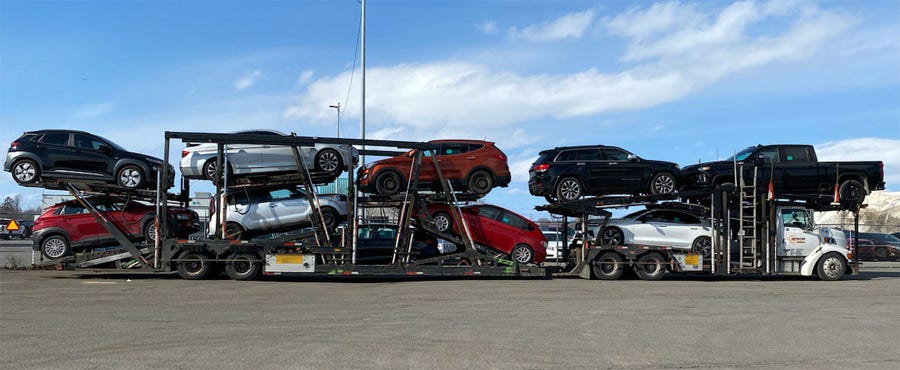Part 1: I Came Together with the People
After that noisy, chaotic, jubilant first weekend in Ottawa with the Freedom Convoy, Luis' employer began calling the four of its drivers who were part of the protest, threatening their jobs if they didn't return to work. Two were quickly persuaded to leave before he himself got the phone call,
'Luis, you have to come home. We need to move a load, I'm behind.'
'I have to stay here, I have to be here till the end.'
'Luis, are you crazy?'
'No, I'm not crazy.'
'Luis, you're going to lose everything. They're going to impound your truck, and you have no insurance. You will be in big trouble.'
I say, 'I am in big trouble already.'
'Luis, you're going to lose your job.'
'If I lose my job, what can I do? I stay here with the people.'
'Are you sure, Luis?'
'Yeah, I'm pretty sure.'
'OK, Luis. Bye, bye, Luis.'
'OK, thank you. God bless you.'
Then aged fifty-nine, he was confident he wouldn't be out of work for long. His auto hauler skillset is a rare one. "Not too many truck drivers can do my job," he says. "I'm pretty sure if I don't have a job with this company today, I have next day with another company."
He soon ran short of clean socks, but supporters supplied all that he needed. "I never forget the people. Very kind people. They give everything. Food, water, jacket, t-shirt. This guy he came, 'You have pants?' He gave me one, it's nice, it's warm. And socks. They buy the bunch, one dozen. Too many, I refuse. I never forget that."
During his weeks in Ottawa, Luis accepted offers of showers in at least four private homes and was often served a meal at the same time. His son visited him in the nation's capital, while his wife of thirty years patiently awaited his return.
"She doesn't worry too much," he explains. "She trusts me.
"Early on, he remembers the police trying to prevent trucks from refueling. Due to the efforts of "some people, intelligent people, we get the gas anyway," he says. "I don't know how, but we get the gas." He suspects he himself received a bad batch of fuel, that someone unsympathetic to the protest had contaminated it with water, antifreeze, or windshield fluid. Suddenly his truck was shaking and making strange noises.
"I ask my friends why my truck is doing this." It was then he learned that others had also experienced fuel contamination. "I was lucky, I took only maybe 40 litres."
After farmers brought the protesters wood to burn in fire barrels amid the extreme cold, Luis says the police confiscated it. "They stole from the people. They put in the pickup truck, took it away."
In the evenings, particularly during the third week of the protest, he was approached frequently. The trucks were thinning out by then, and certain individuals were going door to door, trying to spook the drivers. "The police will be here tonight. Better move your truck. They're going to seize everything to pay for this and that."
Near the end a blond woman, "maybe thirty to forty, she come. Lovely looks, is good-looking lady. I was sitting in my truck. 'Hello!' I put down the window."
The woman asked his name and where he was from. She asked if he owned the truck and trailer. Did he have a wife and a family? Soon she was telling him the police would be making arrests that night. Wasn't he afraid? Every truck would be impounded, she said. They'd be kept for days, it would cost thousands to reclaim them. "I think it's better you move."
He said he wasn't going anywhere. She asked if he was sure. Yes. "She's white girl," he recalls. "And when I told her I'm not moving, she got very upset. Her face comes red - like a tomato."
Another protester asked him about the conversation. According to that chap, the woman had stood to gain a bounty of "$10,000 from the government" if she'd successfully persuaded Luis to depart. It's impossible to verify such a claim, but those were the kinds of things being said out there on Wellington Street as the sun faded, temperatures plummeted, and darkness fell.
next installment: Denied Access to a Lawyer





